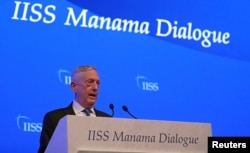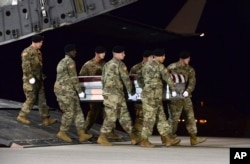The United States is rethinking its role in U.N. peacekeeping missions across Africa, with White House National Security Adviser John Bolton and Defense Secretary Jim Mattis looking to place U.S. forces and resources elsewhere.
When Bolton outlined the administration's new Africa policy Thursday, he announced the U.S. would no longer support "unproductive, unsuccessful and unaccountable U.N. peacekeeping missions."
"We will not provide legitimacy to missions that give large payouts to countries sending poorly equipped soldiers who provide insufficient protection to vulnerable populations on the ground," he said in a speech at The Heritage Foundation, a Washington, D.C.-based policy think tank.
The United States is the U.N.'s top peacekeeping donor, providing nearly a third of its $6.7 billion budget for the fiscal year July 1, 2018 to June 30, 2019. Last year, U.S. Ambassador to the United Nations Nikki Haley led administration efforts to trim the overall peacekeeping budget, which the U.N. agreed to tighten by $500 million.
Mattis asks for options
Pentagon leaders are of a similar mindset, with Mattis recently recommending the pullout of all U.S. peacekeepers from the U.N. peacekeeping mission in Mali, an official told VOA.
Speaking on condition of anonymity, the official said Mattis had asked for options on how to free up the troops for other missions.
The Pentagon has been re-evaluating its troop presence and operations in Africa since an ambush in Niger last year that killed four U.S. soldiers, four Nigerian troops and a Nigerian interpreter.
The U.S. has a very small presence in the United Nations Multidimensional Integrated Stabilization Mission in Mali (MINUSMA), contributing less than two dozen troops to a force that includes more than 13,000 military personnel, mostly from Burkina Faso, Chad, Bangladesh and Senegal.
The mission has been labeled the most dangerous U.N. mission across the globe, with more than 100 peacekeepers killed in the last six years. Al-Qaida linked groups have been tied to over 200 attacks in G5 Sahel countries (Burkina Faso, Chad, Mali, Mauritania, and Niger) since January 2017, primarily targeting MINUSMA forces while terrorizing civilians and destroying infrastructure, according to U.S. Africa Command.
'End of creative thinking'
Bolton on Thursday criticized the deployment of U.N. peacekeepers on the continent as the "end of creative thinking" to resolving conflicts.
He singled out the U.N. Mission for the Referendum in Western Sahara (MINURSA), which has been deployed nearly three decades and has yet to conduct the referendum it was initially tasked with securing. Resources devoted to MINURSA could instead be used toward "economic betterment in the region," Bolton suggested.
He added that the U.S. was reviewing its assistance to South Sudan, where the U.N. has placed thousands of peacekeepers. There are "no regular U.S. armed forces" in this mission, an UNMISS official told VOA, but there are a small number of U.S. military advisers and staff officers.
According to the U.N. Department of Peacekeeping data, of the more than 100,000 U.N. troops and police, the U.S. supplies only 51 personnel in U.N. missions.
Bolton said the review was to ensure U.S. aid is not prolonging the South Sudan civil war, now entering its sixth year.
"We will not provide loans or more American resources to a South Sudanese government led by the same morally bankrupt leaders," he said.
Margaret Besheer at the United Nations contributed to this report.







